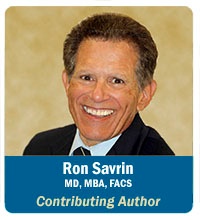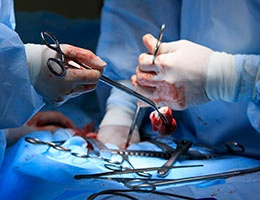[4 MIN READ]
The Problem
The term “Never Events” was used in 2001 to describe a subset of medical errors that, ideally, should never occur. Also known as “Serious Reportable Events,” they encompass a wide variety of surgical, device, patient protection, care management, environmental, radiologic and criminal events. The Agency for Healthcare Research and Quality currently defines 29 such events,[i] one of which is defined as “Unintended retention of a foreign object in a patient after surgery or other procedure.” The Joint Commission (TJC) lists 31 types of sentinel events; of such events voluntarily reported to TJC, the most common is “Unintended Retention of a Foreign Body.”[ii] In a review of paid malpractice claims from the National Practitioner Data Bank, Mehtsun and associates[iii] found that of 1,126 surgical retained foreign body events, 5% resulted in death, 16% in permanent injury, and 78% in temporary injury. This simply cannot be allowed to continue.
A recent review of the problem of retained surgical sponges (RSS) by Steelman et al. (2018)[iv] provides a thoughtful analysis and makes several excellent recommendations. Among the findings of this study were the following:
- In general surgery procedures, sponge counts were performed in 90% of cases; 86% (77% of total cases) of those were considered correct.
- The vagina was the location of the RSS in 24%, but sponge counts were performed in only 58% of vaginal deliveries.
- Radiopaque markers were present on only 62% of retained surgical sponges, which included objects such as towels, Kerlix and undefined types.
- Nearly half of the sponges (49%) were discovered only after the patient was discharged.
The study referenced an earlier risk assessment by Steelman et al.[v] that found that distraction (21%), multi-tasking (18%), and time pressure/emergency were causes of potentially retained sponges. The American College of Surgeons recommends,[vi] among other considerations, that the wound be methodically explored before closure, that X-ray or other technology be used, and that the OR environment be optimal to allow focused performance.
The Solution
We should acknowledge that an RSS is the epitome of a “never event” and that it is preventable in all cases. We should afford zero tolerance for any such occurrence.
- Personnel, especially in the OR, should recognize that interruptions, distractions and attempts to multi-task negatively impact concentration and performance and should be avoided. When in the OR, it has been my practice in over more than 40 years as a vascular surgeon, to refer or delay telephone calls, emergent and non-emergent consultations, and even management decisions on other patients to qualified physicians who are not currently involved in operative care.
- The surgeon MUST perform a complete exploration of all aspects of the surgical wound, specifically inspecting for and searching for foreign bodies prior to initiation of closure.
- Sponge counts should always be performed – emergent conditions and time constraints are NOT valid exceptions.
- Vaginal deliveries/procedures should involve sponge counts, timeouts and adherence to surgical checklists, which should be done in all operative procedures.
- Nursing staff should be allowed – actually encouraged – to perform an accurate and timely sponge count before and after wound closure. That said, in most cases of an RSS, it’s not surprising that the sponge count is reported as correct.
 Even under the best of circumstances and following all policies and procedures, dependence on human performance will never be sufficient to eliminate the RSS problem. An X-ray foreign body (FB) film has been suggested as an effective method of detecting an RSS, but it cannot be relied upon to detect 100% of RSS events. Some objects such as towels, cottenoids, Kerlix, 4x4 pads and others do not have radiopaque markers and should rarely if ever be placed in any body cavity. Often the X-ray film fails to encompass the entire surgical field, so even an RSS with a radiopaque marker can be missed. Routine FB films – as requested by some surgeons and required by some policies and protocols – involve additional operative and/or anesthesia time with the attendant risks and costs thereof, yet they are not 100% effective.
Even under the best of circumstances and following all policies and procedures, dependence on human performance will never be sufficient to eliminate the RSS problem. An X-ray foreign body (FB) film has been suggested as an effective method of detecting an RSS, but it cannot be relied upon to detect 100% of RSS events. Some objects such as towels, cottenoids, Kerlix, 4x4 pads and others do not have radiopaque markers and should rarely if ever be placed in any body cavity. Often the X-ray film fails to encompass the entire surgical field, so even an RSS with a radiopaque marker can be missed. Routine FB films – as requested by some surgeons and required by some policies and protocols – involve additional operative and/or anesthesia time with the attendant risks and costs thereof, yet they are not 100% effective.
A system process using a newer technology – radiofrequency (RF) technology – should be universally adopted and incorporated into standard policies and procedures for all invasive procedures. RFID chips are embedded into all sponges and any other materials used in the OR, and a simple hand-held scanner can be used to identify and count all such materials prior to incision, during the procedure, and after closure. The technology is relatively simple and fast, yet it promises to be more accurate and cost effective than current methods.
Albert Einstein is often quoted as having said the definition of insanity is doing the same thing over and over again but expecting a different result. The solution is not working harder but working smarter. Humans, including surgeons, will always make mistakes. Effective system processes are needed to address the problem. The goal is not just a reduction, but the complete elimination of RSS events. An RSS is the quintessential never event – and Never means NEVER.
Resources:
[i] Agency for Healthcare Research and Quality. Never Events. Patient Safety Primer, PSNET. Available at: https://psnet.ahrq.gov/primers/primer/3/never-events. Last accessed August 22, 2018.
[ii] The Joint Commission. Summary Data of Sentinel Events Reviewed by The Joint Commission. Download available at: https://www.jointcommission.org/sentinel_event_statistics_quarterly/. Last accessed August 22, 2018.
[iii] Mehtsum et al. Surgical never events in the United States. Surgery. 2013;153:465-72.
[iv] Steelman et al. Retained surgical sponges: a descriptive study of 319 occurrences and contributing factors from 2012 to 2017. Patient Safety in Surgery. 2018; 12:20. Available at: https://doi.org/10.1186/s13037-018-0166-0. Last accessed August 22, 2018.
[v] Steelman VM, Cullen JJ. Designing a safer process to prevent retained surgical sponges: a healthcare failure mode and effect analysis. AORN J. 2011;94:132.
[vi] American College of Surgeons. Revised statement on the prevention of unintentionally retained surgical items after surgery. Bulletin of the American College of Surgeons. Oct 1, 2016. Available at: http://bulletin.facs.org/2016/10/revised-statement-on-the-prevention-of-unintentionally-retained-surgical-items-after-surgery/. Last accessed August 23, 2018.



